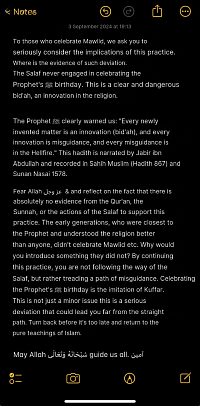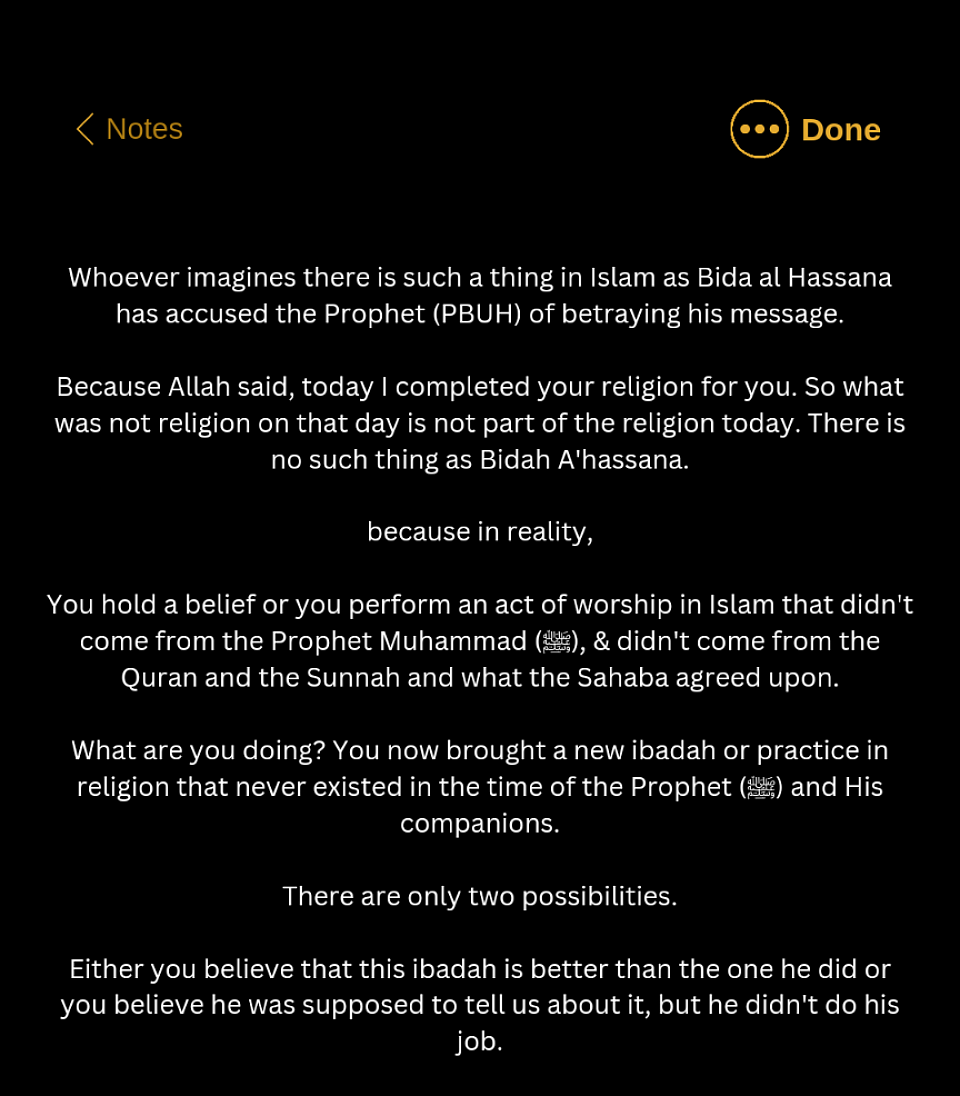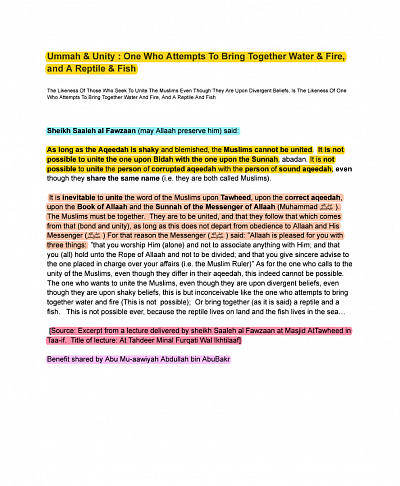Biddah (Innovations)
What is Biddah?
Bid'ah refers to any innovation or practice introduced into the religion that wasn't part of the original teachings of the Prophet Muhammad (Peace and blessings of Allah be upon him).
Hadith
It has been reported from the Prophet (peace and blessings of Allah be upon him) that he said:
"Whoever introduces something into this affair of ours that is not from it will have it rejected."
And he said in another Hadith: 'Stick to my Sunnah and the Sunnah of the Rightly Guided Caliphs after me. Hold on to it tightly and bite onto it with your molars.' ”Beware of newly invented matters, for every newly invented matter is an innovation and every innovation is a misguidance & every misguidance is in hell fire.”
Sunan Abi Dawud 4607, Sahih Muslim (Hadith 867) & Sunan Nasai 1578.
is there any difference between good or a bad Biddah?
Aisha (may Allah be pleased with her) reported:
The Messenger of Allah (peace and blessings of Allah be upon him) said,
“Whoever innovates into this matter of ours (Islam) that which does not belong to it, it will be rejected.”
Source: Ṣaḥīḥ al-Bukhārī 2697, Ṣaḥīḥ Muslim 1718
Good or a bad Biddah?
In Islam, all innovations in matters of faith or worship are considered bid'ah (innovation), and the "Prophet Muhammad (peace and blessings of Allah be upon him) taught that every bid'ah leads astray, and every astray leads to Hell."
"with no distinction between 'good' or 'bad' innovation in religion.”
Whoever imagines there is such a thing in Islam as Bida al Hassana has accused the Prophet (Peace and blessings of Allah be upon him) of betraying his message.
Because Allah said, today I completed your religion for you. So what was not religion on that day is not part of the religion today. There is no such thing as Bidah A'hassana.
because in reality,
You hold a belief or you perform an act of worship in Islam that didn't come from the Prophet Muhammad ( Peace and Blessings of Allah be upon him), & didn't come from the Quran and the Sunnah and what the Sahaba agreed upon.
What are you doing?
You now brought a new ibadah or practice in religion that never existed in the time of the Prophet (Peace and Blessings of Allah be upon him)) and His companions.
There are only two possibilities.
Either you believe that this ibadah is better than the one he did or you believe he was supposed to tell us about it, but he didn't do his job.
So, which one is it?
Misguidance
According to an authentic narration
Abdullah Ibn Umar (may Allah be pleased with him) said:
Every Bid'ah (innovation in the religion) is misguidance even if the people see it as Hasanah (good)
[Al Sunnah' 82]
Fatwah
Shaykh al-Islam Ibn Taymiyyah (may Allah have mercy on him) stated:
"It is obligatory to punish anyone who affiliates with them (the people of innovation), defends them, praises them, honors their books, or is known to help them, assist them, or he hates speaking against them. Such excuses can only be offered by someone who is ignorant or a hypocrite. It is obligatory to punish anyone who knows their situation and does not support the effort against them because defending the religion against their corruption is one of the greatest duties."
(Majmu' al-Fatawa, Vol. 2, p. 132)
Concerning the danger of the people of innovation, Shaykh-ul-Islaam Ibn Taimiyyah, may Allaah have mercy on him, said: “If it were not for those whom Allaah placed to repel the danger of them [meaning the innovators], the Religion would have been corrupted. Their corruption is worse than the corruption caused by the conquering of the enemies at times of war. For indeed, when they conquer, they do not corrupt hearts or the Religion found in them, except for a while. But as for these people [i.e. the innovators], then they corrupt the hearts from the very beginning.” (Majmoo’-ul-Fataawaa: (28/232) He (Ibn Taimiyyah). also said (20/103): “The people of innovation are worse than the people of lustful sins, according to the Sunnah and the Ijmaa’ (consensus).”– This is why the Salaf would say: “Being moderate while upon the Sunnah is better than exerting oneself while upon Innovation.
This statement is reported from Ibn Mas’ood, may Allaah be pleased with him. Refer to AlLaalikaa’ee (1/188, no. 114), Al-Ibaanah (1/320, no. 161) and As-Sunnah of Ibn Nasr (30).]
Reference: Beneficial Answers to Questions on Innovated Methodologies – Shaykh Saalih-al-Fawzaan Pg. 31-32
Few other Narrations
- Imam Ahmad ibn Hanbal (rahimahullah) said in his essential work, 'The Foundations of the Sunnah':
"[The foundations of the Sunnah with us are] to abandon controversies, & sitting with the People of Desires - and to abandon quarrelling, argumentation, and controversy in the religion"
- An innovation is more beloved to iblees (the devil) than a sin because repentance is made for a sin, but is not made for an innovation.
—Sufyān al-Thawrī
This is because the innovator believes he is doing something good and therefore sees no need to repent. But in fact he's doing a major sin .
- Shaykh Saalih-al-Fawzaan said The innovators will have a worse punishment, since innovations are worse than sins. Innovations are more beloved to the Devil than sins because (it is likely that) the sinner may repent
- Ibn Taimiyyah also said:
“The people of innovation are worse than the people of lustful sins, according to the Sunnah and the Ijmaa’ (consensus)
Curse be upon the Innovators?
- Narrated Qays ibn Abbad:
I and Ashtar went to Ali and said to him: Did the Messenger of Allah give you any instruction about anything for which he did not give any instruction to the people in general?
He said: No, except what is contained in this document of mine. Musaddad said: He then took out a document. Ahmad said: A document from the sheath of his sword.
It contained: The lives of all Muslims are equal; they are one hand against others; the lowliest of them can guarantee their protection. Beware, a Muslim must not be killed for an infidel, nor must one who has been given a covenant be killed while his covenant holds.
If anyone introduces an innovation, he will be responsible for it. If anyone introduces an innovation or gives shelter to a man who introduces an innovation (in religion), he is cursed by Allah, by His angels, and by all the people.
Sunan Abi Dawud 4530
Grade Shaih (Albani)
Ummah & Unity: One Who Attempts To Bring Together Water & Fire, and A Reptile & Fish
The Likeness Of Those Who Seek To Unite The Muslims Even Though They Are Upon Divergent Beliefs, Is The Likeness Of One Who Attempts To Bring Together Water And Fire, And A Reptile And Fish.
Sheikh Saaleh al Fawzaan (may Allaah preserve him) said:
As long as the Aqeedah is shaky and blemished, the Muslims cannot be united. It is not possible to unite the one upon Bidah with the one upon the Sunnah, abadan. It is not possible to unite the person of corrupted aqeedah with the person of sound aqeedah, even though they share the same name (i.e. they are both called Muslims).
It is inevitable to unite the word of the Muslims upon Tawheed, upon the correct aqeedah, upon the Book of Allaah and the Sunnah of the Messenger of Allaah (Muhammad ﷺ). The Muslims must be together. They are to be united, and that they follow that which comes from that (bond and unity), as long as this does not depart from obedience to Allaah and His Messenger ﷺ
For that reason the Messenger (ﷺ) said: "Allaah is pleased for you with three things: "that you worship Him (alone) and not to associate anything with Him; and that you (all) hold unto the Rope of Allaah and not to be divided; and that you give sincere advise to the one placed in charge over your affairs (i.e. the Muslim Ruler)" As for the one who calls to the unity of the Muslims, even though they differ in their aqeedah, this indeed cannot be possible. The one who wants to unite the Muslims, even though they are upon divergent beliefs, even though they are upon shaky beliefs, this is but inconceivable like the one who attempts to bring together water and fire (This is not possible); Or bring together (as it is said) a reptile and a fish. This is not possible ever, because the reptile lives on land and the fish lives in the sea...
Source: Excerpt from a lecture delivered by sheikh Saaleh al Fawzaan at Masjid AtTawheed in Taa-if. Title of lecture: At Tahdeer Minal Furqati Wal Ikhtilaaf



